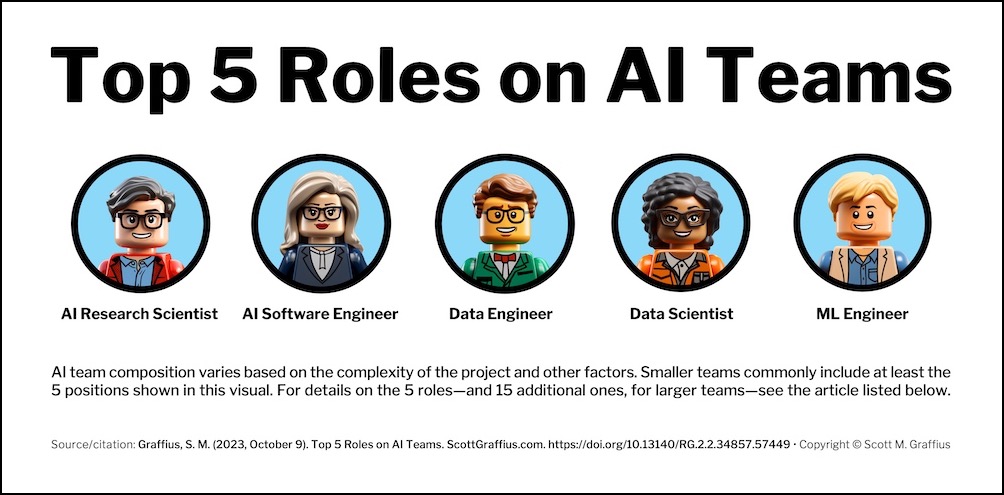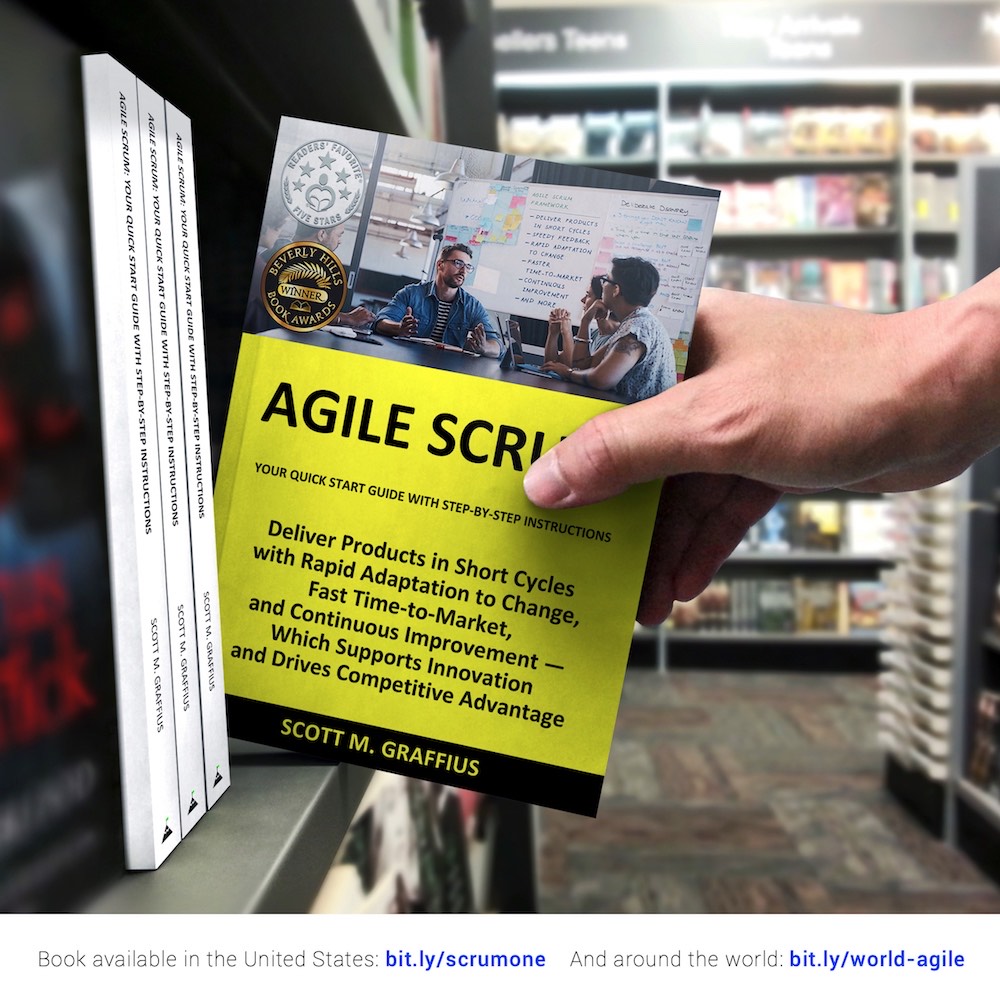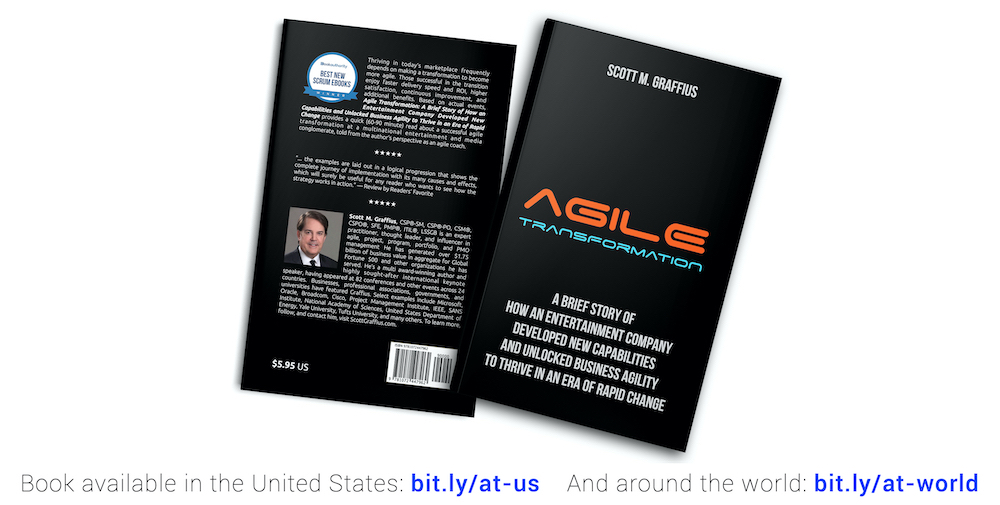Technical Project Management
Top 5 Roles on AI Teams
09 October 2023
BY SCOTT M. GRAFFIUS | ScottGraffius.com

Select here to download a PDF of this article.

Effective Artificial Intelligence (AI) teams leverage critical hard skills and soft skills to develop and deliver successful AI products, including innovative solutions that address real-world challenges and have a positive impact on the world. (If you’d like to learn about the critical skills leveraged by effective AI teams, select here for our popular article on the topic.) This article focuses on the roles on AI teams.

The composition (size and roles) of AI teams varies by organization based on the respective company’s needs, the nature of the AI endeavor including complexity, and other factors. However, AI teams commonly include (at least these) five positions. Here are the five along with brief descriptions, listed in alphabetical order:
The above five roles collectively cover key aspects of AI development — from research and model creation to data management and software integration. Depending on requirements and characteristics (such as degree of complexity), additional positions may be needed.
An expanded list of 20 roles common to AI teams follow. Here are the aforementioned 5 and 15 additional positions, listed in alphabetical order:
The composition (size and roles) of AI teams varies, based on the complexity of the AI project and other factors. On smaller teams, individuals often ‘wear multiple hats.’ On larger teams, individuals typically have more specialized roles.

This article covered the roles common to AI teams. Listings are not exhaustive of all potential positions. Additionally, as the field of AI continues to evolve and advance, new roles may materialize to address emerging challenges and opportunities.
(If you’d like to learn about the critical skills leveraged by successful AI teams, select here for our popular article on the topic.)

References/Sources
All of the supplied links were functional when this article was published.

How to Cite This Article
Graffius, Scott M. (2023, October 9). Top 5 Roles on AI Teams. Available at: https://scottgraffius.com/blog/files/ai-team-roles.html. DOI: 10.13140/RG.2.2.34857.57449.





About Scott M. Graffius

Scott M. Graffius, PMP, SA, CSP-SM, CSP-PO, CSM, CSPO, SFE, ITIL, LSSGB is an agile project management practitioner, consultant, multi-award-winning author, and international keynote speaker. He is the Founder of Exceptional PPM and PMO Solutions™ and subsidiary Exceptional Agility™. He has generated over $1.9 billion of business value in aggregate for Global Fortune 500 businesses and other organizations he has served. Graffius and content from his books, talks, workshops, and more have been featured and used by businesses, professional associations, governments, and universities. Examples include Microsoft, Oracle, Broadcom, Cisco, Gartner, Project Management Institute, IEEE, Qantas, National Academy of Sciences, United States Department of Energy, New Zealand Ministry of Education, Yale University, Tufts University, and others. He has delighted audiences with dynamic and engaging talks and workshops on agile, project management, and technology (including AI, GameDev, and more) leadership at 87 conferences and other events across 25 countries.
His full bio is available here.
Connect with Scott on:


About Agile Scrum: Your Quick Start Guide with Step-by-Step Instructions

Shifting customer needs are common in today's marketplace. Businesses must be adaptive and responsive to change while delivering an exceptional customer experience to be competitive.
There are a variety of frameworks supporting the development of products and services, and most approaches fall into one of two broad categories: traditional or agile. Traditional practices such as waterfall engage sequential development, while agile involves iterative and incremental deliverables. Organizations are increasingly embracing agile to manage projects, and best meet their business needs of rapid response to change, fast delivery speed, and more.
With clear and easy to follow instructions, the multi award-winning Agile Scrum: Your Quick Start Guide with Step-by-Step Instructions book by Scott M. Graffius (Chris Hare and Colin Giffen, Technical Editors) helps the reader:
Hailed by Literary Titan as “the book highlights the versatility of Scrum beautifully.”
Winner of 17 first place awards.
Agile Scrum: Your Quick Start Guide with Step-by-Step Instructions is available in paperback and ebook/Kindle in the United States and around the world. Some links by country follow.

About Agile Transformation: A Brief Story of How an Entertainment Company Developed New Capabilities and Unlocked Business Agility to Thrive in an Era of Rapid Change

Thriving in today's marketplace frequently depends on making a transformation to become more agile. Those successful in the transition enjoy faster delivery speed and ROI, higher satisfaction, continuous improvement, and additional benefits.
Based on actual events, Agile Transformation: A Brief Story of How an Entertainment Company Developed New Capabilities and Unlocked Business Agility to Thrive in an Era of Rapid Change provides a quick (60-90 minute) read about a successful agile transformation at a multinational entertainment and media company, told from the author's perspective as an agile coach.
The award-winning book by Scott M. Graffius is available in paperback and ebook/Kindle in the United States and around the world. Some links by country follow.

The short link for this article is: https://bit.ly/ai-roles.
© Copyright 2023 Scott M. Graffius. All rights reserved. This material may not be published, broadcast, rewritten or redistributed without the express written permission of Scott M. Graffius.


Select here to download a PDF of this article.

Effective Artificial Intelligence (AI) teams leverage critical hard skills and soft skills to develop and deliver successful AI products, including innovative solutions that address real-world challenges and have a positive impact on the world. (If you’d like to learn about the critical skills leveraged by effective AI teams, select here for our popular article on the topic.) This article focuses on the roles on AI teams.

The composition (size and roles) of AI teams varies by organization based on the respective company’s needs, the nature of the AI endeavor including complexity, and other factors. However, AI teams commonly include (at least these) five positions. Here are the five along with brief descriptions, listed in alphabetical order:
- AI Research Scientist: AI research scientists are responsible for conducting research and developing cutting-edge AI algorithms and models.
- AI Software Engineer: AI software engineers are responsible for integrating AI components into software applications. They bridge the gap between AI research and practical implementation, making AI systems usable by end-users.
- Data Engineer: Data engineers are responsible for building and managing the data pipelines that feed AI models. They ensure that data is collected, cleaned, and prepared in a format suitable for analysis and model training.
- Data Scientist: Data scientists are experts in data analysis and interpretation. They preprocess, analyze, and extract valuable insights from data, which is vital for training and improving AI models.
- Machine Learning Engineer: Machine learning engineers focus on implementing and deploying machine learning models into practical applications. They work to ensure that AI models are integrated into software systems effectively.
The above five roles collectively cover key aspects of AI development — from research and model creation to data management and software integration. Depending on requirements and characteristics (such as degree of complexity), additional positions may be needed.
An expanded list of 20 roles common to AI teams follow. Here are the aforementioned 5 and 15 additional positions, listed in alphabetical order:
- AI DevOps Engineer: Combines development and operations skills to streamline AI model deployment. They automate tasks.
- AI Ethicist: Ensures that AI systems are developed and used responsibly and ethically.
- AI Infrastructure Engineer: Builds and maintains the infrastructure required for AI model deployment and scalability.
- AI Legal and Compliance Specialist: Ensures AI projects comply with legal and regulatory requirements.
- AI Marketing Specialist: Promotes and markets AI products and solutions to customers and stakeholders.
- AI Operations (AIOps) Specialist: Focuses on the operational aspects of AI, including monitoring, maintenance, and troubleshooting.
- AI Product Manager: Oversees the development and deployment of AI products.
- AI Project Manager: Leverages general and specialized hard skills and soft skills, and applies their understanding of many aspects of artificial intelligence (such as machine learning, deep learning, automation, robotics, and natural language processing) to manage the planning, execution, and delivery of AI projects. Note: Titles vary by organization; the position may be called an AI Project Manager, AI Program Manager, Agile Project Manager, Technical Project Manager, Scrum Master, or another related designation.
- AI QA Engineer: Ensures the quality and reliability of AI models through testing and validation.
- AI Research Scientist: Conducts research to develop new AI algorithms and models.
- AI Software Engineer: Builds and maintains software systems that incorporate AI components.
- AI Trainer/Annotator: Prepares and labels data for training AI models, especially for supervised learning.
- AI UX/UI Designer: Designs user interfaces and experiences for AI-powered applications.
- Computer Vision Engineer: Specializes in developing AI models for image and video analysis.
- Data Analyst: Examines data to uncover trends and insights that can guide AI projects.
- Data Engineer: Manages data pipelines and prepares data for analysis and model training.
- Data Scientist: Analyzes and interprets data to extract insights and inform AI models.
- Deep Learning Engineer: Focuses on deep neural networks and architectures.
- Machine Learning Engineer: Focuses on implementing and deploying machine learning models.
- Natural Language Processing (NLP) Engineer: Specializes in working with text and language-related AI tasks.
The composition (size and roles) of AI teams varies, based on the complexity of the AI project and other factors. On smaller teams, individuals often ‘wear multiple hats.’ On larger teams, individuals typically have more specialized roles.

This article covered the roles common to AI teams. Listings are not exhaustive of all potential positions. Additionally, as the field of AI continues to evolve and advance, new roles may materialize to address emerging challenges and opportunities.
(If you’d like to learn about the critical skills leveraged by successful AI teams, select here for our popular article on the topic.)

References/Sources
All of the supplied links were functional when this article was published.
- Apple (n.d.). Careers at Apple: Machine Learning and AI. Available at: https://www.apple.com/careers/us/machine-learning-and-ai.html.
- C3.ai (n.d.). Best Practices in Prototyping: Cross-Functional Teams. Available at: https://c3.ai/introduction-what-is-machine-learning/cross-functional-teams/.
- Deloitte AI Institute (2021). Building Successful AI Teams. Available at: https://www2.deloitte.com/content/dam/Deloitte/us/Documents/deloitte-analytics/us-ai-institute-building-successful-AI-teams.pdf.
- Gartner (2020, December 15). Staff AI Teams with Various Roles and Skills for Success. Available at: https://www.gartner.com/smarterwithgartner/how-to-staff-your-ai-team.
- General Services Administration (GSA) Centers of Excellence (CoE) (n.d.). AI Guide for Government. Available at: https://coe.gsa.gov/coe/ai-guide-for-government/understanding-ai-job-roles-career-path/.
- Google Quantum AI (n.d.). Careers. Available at: https://quantumai.google/team/careers.
- Graffius, Scott M. (2023, May 1). AI is a Team Sport: A Confluence of Diverse Technical and Soft Skills are Crucial for Success. Available at: https://www.scottgraffius.com/blog/files/successful-ai-teams.html.
- Graffius, Scott M. (2023). What Successful AI Teams Have in Common [Video]. Graffius’ talk at the 2023 Conf42 Quantum Computer Conference. Available at: https://www.youtube.com/watch?v=u2qRKFbSKYE.
- IBM (n.d.). Assemble the Team to Support a Data-Driven Project. Available at: https://www.ibm.com/garage/method/practices/culture/assemble-team-for-data-driven-project/.
- Intel (n.d.). Artificial Intelligence Teams: Careers. Available at: https://jobs.intel.com/en/search-jobs/artificial+intelligence/599/1.
- Intuit (2020, December 8). How to avoid conflicts and delays in the AI development process (Part I). Available at: https://blogs.intuit.com/2020/12/08/how-to-avoid-conflicts-and-delays-in-the-ai-development-process-part-i/.

How to Cite This Article
Graffius, Scott M. (2023, October 9). Top 5 Roles on AI Teams. Available at: https://scottgraffius.com/blog/files/ai-team-roles.html. DOI: 10.13140/RG.2.2.34857.57449.



About Scott M. Graffius

Scott M. Graffius, PMP, SA, CSP-SM, CSP-PO, CSM, CSPO, SFE, ITIL, LSSGB is an agile project management practitioner, consultant, multi-award-winning author, and international keynote speaker. He is the Founder of Exceptional PPM and PMO Solutions™ and subsidiary Exceptional Agility™. He has generated over $1.9 billion of business value in aggregate for Global Fortune 500 businesses and other organizations he has served. Graffius and content from his books, talks, workshops, and more have been featured and used by businesses, professional associations, governments, and universities. Examples include Microsoft, Oracle, Broadcom, Cisco, Gartner, Project Management Institute, IEEE, Qantas, National Academy of Sciences, United States Department of Energy, New Zealand Ministry of Education, Yale University, Tufts University, and others. He has delighted audiences with dynamic and engaging talks and workshops on agile, project management, and technology (including AI, GameDev, and more) leadership at 87 conferences and other events across 25 countries.
His full bio is available here.
Connect with Scott on:


About Agile Scrum: Your Quick Start Guide with Step-by-Step Instructions

Shifting customer needs are common in today's marketplace. Businesses must be adaptive and responsive to change while delivering an exceptional customer experience to be competitive.
There are a variety of frameworks supporting the development of products and services, and most approaches fall into one of two broad categories: traditional or agile. Traditional practices such as waterfall engage sequential development, while agile involves iterative and incremental deliverables. Organizations are increasingly embracing agile to manage projects, and best meet their business needs of rapid response to change, fast delivery speed, and more.
With clear and easy to follow instructions, the multi award-winning Agile Scrum: Your Quick Start Guide with Step-by-Step Instructions book by Scott M. Graffius (Chris Hare and Colin Giffen, Technical Editors) helps the reader:
- Implement and use the most popular agile framework―Scrum;
- Deliver products in short cycles with rapid adaptation to change, fast time-to-market, and continuous improvement; and
- Support innovation and drive competitive advantage.
Hailed by Literary Titan as “the book highlights the versatility of Scrum beautifully.”
Winner of 17 first place awards.
Agile Scrum: Your Quick Start Guide with Step-by-Step Instructions is available in paperback and ebook/Kindle in the United States and around the world. Some links by country follow.
- 🇧🇷 Brazil
- 🇨🇦 Canada
- 🇨🇿 Czech Republic
- 🇩🇰 Denmark
- 🇫🇮 Finland
- 🇫🇷 France
- 🇩🇪 Germany
- 🇬🇷 Greece
- 🇭🇺 Hungary
- 🇮🇳 India
- 🇮🇪 Ireland
- 🇮🇱 Israel
- 🇮🇹 Italy
- 🇯🇵 Japan
- 🇱🇺 Luxembourg
- 🇲🇽 Mexico
- 🇳🇱 Netherlands
- 🇳🇿 New Zealand
- 🇳🇴 Norway
- 🇪🇸 Spain
- 🇸🇪 Sweden
- 🇨🇭 Switzerland
- 🇦🇪 UAE
- 🇬🇧 United Kingdom
- 🇺🇸 United States

About Agile Transformation: A Brief Story of How an Entertainment Company Developed New Capabilities and Unlocked Business Agility to Thrive in an Era of Rapid Change

Thriving in today's marketplace frequently depends on making a transformation to become more agile. Those successful in the transition enjoy faster delivery speed and ROI, higher satisfaction, continuous improvement, and additional benefits.
Based on actual events, Agile Transformation: A Brief Story of How an Entertainment Company Developed New Capabilities and Unlocked Business Agility to Thrive in an Era of Rapid Change provides a quick (60-90 minute) read about a successful agile transformation at a multinational entertainment and media company, told from the author's perspective as an agile coach.
The award-winning book by Scott M. Graffius is available in paperback and ebook/Kindle in the United States and around the world. Some links by country follow.
- 🇦🇺 Australia
- 🇦🇹 Austria
- 🇧🇷 Brazil
- 🇨🇦 Canada
- 🇨🇿 Czech Republic
- 🇩🇰 Denmark
- 🇫🇮 Finland
- 🇫🇷 France
- 🇩🇪 Germany
- 🇬🇷 Greece
- 🇮🇳 India
- 🇮🇪 Ireland
- 🇯🇵 Japan
- 🇱🇺 Luxembourg
- 🇲🇽 Mexico
- 🇳🇱 Netherlands
- 🇳🇿 New Zealand
- 🇪🇸 Spain
- 🇸🇪 Sweden
- 🇨🇭 Switzerland
- 🇦🇪 United Arab Emirates
- 🇬🇧 United Kingdom
- 🇺🇸 United States

The short link for this article is: https://bit.ly/ai-roles.
© Copyright 2023 Scott M. Graffius. All rights reserved. This material may not be published, broadcast, rewritten or redistributed without the express written permission of Scott M. Graffius.

